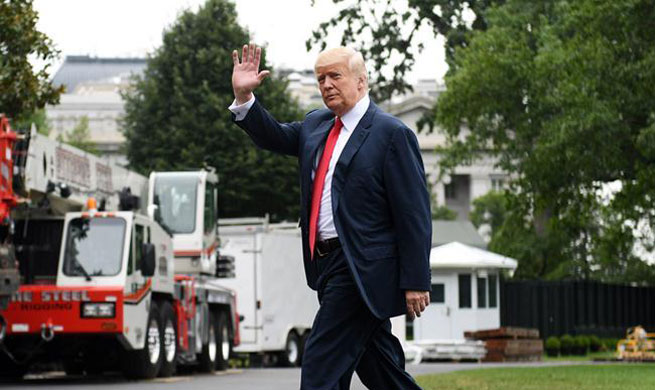BEIJING, Aug. 15 (Xinhua) -- In another show of his tougher trade stance, U.S. President Donald Trump on Monday asked his top trade adviser to determine whether to start a so-called Section 301 investigation into China's trade practices and policies.
Section 301, a trade tool frequently used by Washington before the World Trade Organization (WTO) came into existence, allows the U.S. president to unilaterally impose hefty tariffs and other trade limits on partners deemed to possess unfair advantages.
While it is still too soon to say that the United States intends a showdown with China on trade, it is no exaggeration that the latest baring of fangs on Washington's part against China, like all the other unilateral moves by Washington, will hurt not only China, but the United States itself in the long run.
As many pundits have observed, the United States has long been a fan of unilateralism given its position as the world's single most powerful country for decades.
Since the start of the Cold War, Washington has become increasingly adept at the use of unilateral sanctions in attempts to subdue countries that are not playing along with the United States.
In the 1990s, at the heyday of U.S. economic sanctions, the country accounted for some 70 percent of all global cases of sanctions, with nearly half of the world population living in the shadow of the U.S. punitive measures.
In essence, arbitrary U.S. sanctions during the period were a mirror of U.S. supremacy.
The country seems to have a diminished appetite for sanctions in the 21th century, largely due to the fact that the world is rapidly moving toward a multi-polar order, and that there is growing awareness in Washington about the ineffectiveness of such sanctions.
Even worse, such penalties could trigger retaliatory moves by the intended targets, to the detriment of world security and prosperity.
Should the United States decide to slap trade sanctions against China, Chinese exporters may be the first to suffer, but the pain will soon be felt by U.S. industries, which depend on quality supplies from China to conduct business, as well as by many U.S. households, which enjoy a comfortable life thanks to inexpensive daily items imported from China.
China has made clear its willingness to solve the various challenges facing its trade with the United States through talks, and the country believes a possible trade war between the world's two largest economies is in the interest of none.
Hopefully Washington will ditch such a heavy-handed approach and start working toward a mutually acceptable plan to resolve the various protruding issues in bilateral trade. If not, there would be too much at stake, and the whole world stands to lose.

















